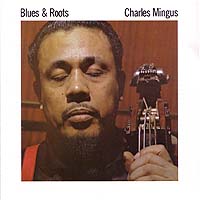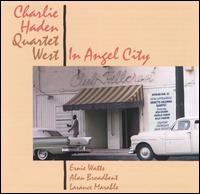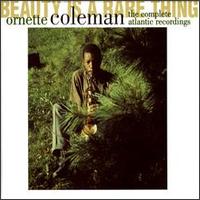
Randolph Denard Ornette Coleman was an American jazz saxophonist, trumpeter, violinist, and composer. He was best known as a principal founder of the free jazz genre, a term derived from his 1960 album Free Jazz: A Collective Improvisation. His pioneering works often abandoned the harmony-based composition, tonality, chord changes, and fixed rhythm found in earlier jazz idioms. Instead, Coleman emphasized an experimental approach to improvisation, rooted in ensemble playing and blues phrasing. AllMusic called him "one of the most beloved and polarizing figures in jazz history," noting that while "now celebrated as a fearless innovator and a genius, he was initially regarded by peers and critics as rebellious, disruptive, and even a fraud."

Rocco Scott LaFaro was an American jazz double bassist known for his work with the Bill Evans Trio. LaFaro broke new ground on the instrument, developing a countermelodic style of accompaniment rather than playing traditional walking basslines, as well as virtuosity that was practically unmatched by any of his contemporaries. Despite his short career, he remains one of the most influential jazz bassists, and was ranked number 16 on Bass Player magazine's top 100 bass players of all time.

The Shape of Jazz to Come is the third album by jazz musician Ornette Coleman. Released on Atlantic Records in 1959, it was his debut on the label and his first album featuring the working quartet including himself, trumpeter Don Cherry, bassist Charlie Haden, and drummer Billy Higgins. The recording session for the album took place on May 22, 1959, at Radio Recorders in Hollywood, California. Although Coleman initially wished for the album to be titled Focus on Sanity after the LP's fourth track, Atlantic producer Nesuhi Ertegun suggested the final title, feeling that it would give consumers "an idea about the uniqueness of the LP."

Oh Yeah is a studio album by the American jazz bassist and composer Charles Mingus, released in April 1962 by Atlantic Records. It was recorded in 1961, and features Mingus singing on three of the cuts and playing piano throughout.

Blues & Roots is an album by Charles Mingus, recorded in 1959 and released on the Atlantic label in 1960. It has been reissued on CD by both Atlantic and Rhino.

This Is Our Music is the fifth album by saxophonist Ornette Coleman, recorded in 1960 and released on Atlantic Records in March 1961. It is the first with drummer Ed Blackwell replacing his predecessor Billy Higgins in the Coleman Quartet, and is the only one of Coleman's Atlantic albums to include a standard, in this case a version of "Embraceable You" by George and Ira Gershwin.

Free Jazz: A Collective Improvisation is the sixth album by jazz saxophonist and composer Ornette Coleman, released on Atlantic Records in September 1961: the fourth of Coleman's six albums for the label. Its title named the then-nascent free jazz movement. The recording session took place on December 21, 1960, at A&R Studios in New York City. The sole outtake from the album session, "First Take," was later released on the 1971 compilation Twins and subsequent CD reissues of Free Jazz.

The Avant-Garde is an album credited to jazz musicians John Coltrane and Don Cherry that was released in 1966 by Atlantic Records. It features Coltrane playing several compositions by Ornette Coleman accompanied by the members of Coleman's quartet: Cherry, Charlie Haden, and Ed Blackwell. The album was assembled from two unissued recording sessions at Atlantic Studios in New York City in 1960.

Expectations is an album recorded by Keith Jarrett in 1972 and released on Columbia Records the same year. In addition to Jarrett, musicians on the recording include his "American quartet": Dewey Redman on tenor saxophone, Charlie Haden on bass, and Paul Motian on drums. Also featured are Sam Brown on electric guitar, Airto on percussion, as well as brass and string sections whose members are not credited in the album information. Expectations was produced by George Avakian, Jarrett's manager since 1966.

Twins is an album credited to jazz composer and saxophonist Ornette Coleman, released by Atlantic Records in 1971. The album was assembled without Coleman's input, comprising outtakes from recording sessions of 1959 to 1961 for The Shape of Jazz to Come, This Is Our Music, Free Jazz: A Collective Improvisation, and Ornette! Sessions for "Monk and the Nun" took place at Radio Recorders in Hollywood, California; for "First Take" at A&R Studios in New York City, and all others at Atlantic Studios also in Manhattan. The track "First Take" was a first attempt at "Free Jazz" from the album of the same name.
Discography for American jazz saxophonist Ornette Coleman.

Ornette! is the seventh album by alto saxophonist and composer Ornette Coleman, released in February 1962 on Atlantic Records. The album features Scott LaFaro in place of Charlie Haden, who had left the Quartet but would work again with Coleman in the future.

Rush Hour is an album by the American jazz saxophonist Joe Lovano, featuring an orchestra arranged and conducted by Gunther Schuller, recorded in 1994 and released on the Blue Note label.

The Art of the Improvisers is an album credited to jazz composer and saxophonist Ornette Coleman, released by Atlantic Records in 1970. The album was assembled without Coleman's input, comprising outtakes from recording sessions of 1959 to 1961 for The Shape of Jazz to Come, Change of the Century, This Is Our Music, Ornette!, and Ornette on Tenor. Recording sessions in 1959 took place at Radio Recorders in Hollywood, California; those in 1960 and 1961 at Atlantic Studios in New York City.

To Whom Who Keeps a Record is an album credited to jazz composer and saxophonist Ornette Coleman, originally released by the Japanese subsidiary Warner Pioneer of Warner Bros. Records in 1975. The album, which was assembled by Atlantic producer İlhan Mimaroğlu without Coleman's input, comprises outtakes from Atlantic Records recording sessions of 1959 and 1960 for Change of the Century and This Is Our Music. Sessions for "Music Always" took place at Radio Recorders in Hollywood, California with Billy Higgins on drums; all others took place at Atlantic Studios in New York City with drummer Ed Blackwell.

Science Fiction is an album by the American jazz saxophonist and composer Ornette Coleman, recorded in 1971 and released on the Columbia label.

In Angel City is an album by the American jazz bassist Charlie Haden's Quartet West, recorded in 1988 and released on the Verve label.

Jazz Abstractions is a third stream album combining elements of jazz and classical music recorded in late 1960 for the Atlantic label.

The Love Revolution: Complete 1968 Italian Tour is a two-CD live album by the Ornette Coleman Quartet. Three tracks were recorded on February 5, 1968, in Milan, Italy, while the remaining four tracks were recorded on February 8, 1968, in Rome. The album was released in 2005 by Gambit Records, and was reissued in 2015 by Solar Records. The quartet format is unusual in that it features Coleman with two bassists, Charlie Haden and David Izenzon, along with drummer Ed Blackwell. On the Milan tracks, Coleman is heard on alto saxophone, while on the Rome tracks, he also plays trumpet and, on a track titled "Buddha Blues," shehnai.

The Complete Science Fiction Sessions is a two-CD compilation album by Ornette Coleman. Released by Columbia Records in 2000, it brings together tracks recorded during September and October 1971 and September 1972 sessions at Columbia Studios in New York City. The album includes all of the music that was originally issued on Science Fiction and Broken Shadows, along with previously unreleased material. On the album, Coleman is joined by a core group of long-time associates consisting of trumpeters Don Cherry and Bobby Bradford, saxophonist Dewey Redman, double bassist Charlie Haden, and drummers Billy Higgins and Ed Blackwell. Guest artists include guitarist Jim Hall, pianist Cedar Walton, trumpeters Carmine Fornarotto and Gerard Schwarz, and vocalists David Henderson, Asha Puthli, and Webster Armstrong.



















